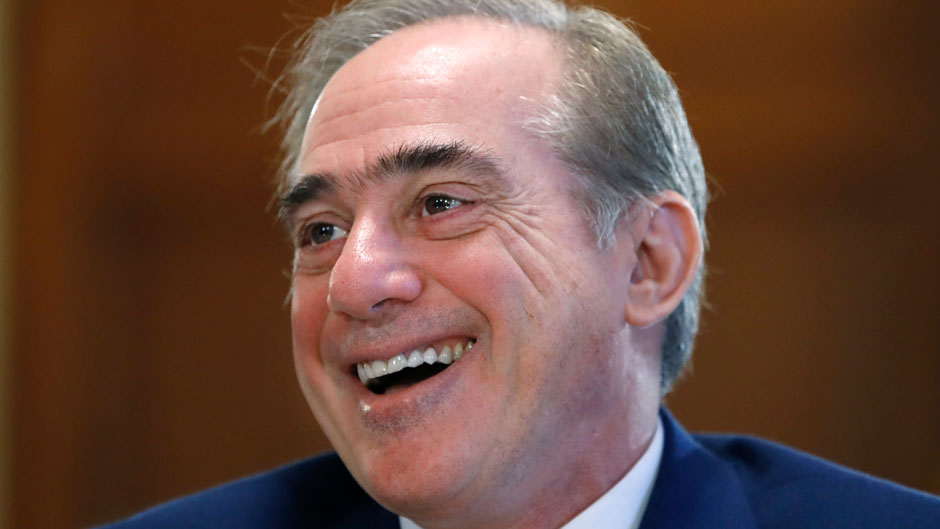Confirmed to the cabinet post by a 100-0 U.S. Senate vote in January 2017, David Shulkin took over as secretary of the U.S. Department of Veteran Affairs, the second largest government agency with 360,000 employees and a $200-billion budget.
“The system was broken, and the reason it was broken was because veterans were waiting long periods of time for care, and worse, that some veterans were harmed and some even died because of those waits,” said Shulkin, who was named undersecretary of the VA in 2015 during the Obama administration. “By the end of the administration, I was able to look President Obama in the eye and say, ‘we fixed this, we put in same-day services in every VA across the country.’ ”
The lone member of the Obama cabinet retained in the new Trump administration, Shulkin was promoted to full secretary.
“I didn’t come to Washington for any political reasons, in fact, I was disinterested in politics—I wanted to make a difference and fix a broken system for our veterans,” he said. “If you’re going to be an effective leader, you have to have principles and communicate clearly so people understand why you’re making the decisions that you do.”
Shulkin, who has a M.D. and was president and CEO of a New York City hospital before beginning government service, returned to the private sector in 2018.
Guided by questions from John Quelch, dean of the University of Miami Patti and Allan Herbert Business School, Shulkin explained how he exercised leadership and went about his mission.
Unsure whether the agency was so bureaucratically paralyzed that it should be scuttled—the United States is, after all, the only country in the world that has an entire agency dedicated to provide health care for veterans—Shulkin scrutinized the agency’s processes and concluded that the VA managed some aspects of care very well, such as behavioral mental health. But it handled others exceedingly poorly, such as taking three weeks to make basic black eyeglasses.
During his tenure with the VA, Shulkin helped get 11 major bills—legislation that restructured the GI Bill for educational benefits, changed the appeals process on disability decisions, altered hiring and firing practices to enhance accountability, expanded mental health benefits, synched the electronic medical records practice with the Defense Department, among others—passed by Congress.
“We fundamentally reformed and changed this organization, but that is not to say that there wasn’t and isn’t a lot of work still to be done,” he concluded.
A year and two months into his position, he held a lengthy afternoon phone call with President Trump in which they discussed the priorities of work in the agency.
Five hours later, Shulkin learned that he’d been terminated, the “beneficiary of a presidential tweet.”
He spent that evening alone in his office and composed an editorial about his experience as chief of the VA that was published in the New York Times. The last line read: “It shouldn’t be this hard to serve your country.”
That line became the title of a book in which Shulkin argues why veterans deserve a better system of health care.
In the webinar, which included the participation of alumni from around the world, Shulkin expressed his appreciation for the efforts of Anthony Fauci (the director of the National Institute of Allergy and Infectious Diseases) and all government officials who provide principled leadership, especially in a time of crisis.
Cindy Munro, dean of the School of Nursing and Health Studies, attended the session and questioned Shulkin regarding his efforts to advance the role of nurses in caring for veterans.
“The issue of giving nurses independent practice authority was the single most controversial decision that I had to consider,” Shulkin explained. With public opinion—400,000 letters, calls, and emails—Congress, and medical caucuses all split 50/50, he traveled the country to visit hospitals in search of the best answer.
He found instance after instance of qualified nurses not able to provide needed care because there were not supervisors to guide them.
“This is absurd,” he remembered thinking. He made the decision to grant practice authority to advanced practice registered nurses across the country.
“Not only was the decision very successful, it helped us in our efforts to eliminate wait times and to provide same-day service to our veterans,” Shulkin said.
Shulkin tackled health care questions from the prospects of sports returning, to opening beaches in Florida, to the single-payer system, to the possibilities of a second and subsequent waves of the virus.
Among his responses, he celebrated the long-term prospects for telehealth that have proved especially valuable in the current pandemic.
“Telehealth has been around for years. It’s not a technological issue; it’s a regulatory and reimbursement issue not being paid for,” he said, adding that “absolutely” this should be a permanent change. “It would be a foolish mistake to return to the old ways of care when we’ve all seen how effective this can be.”
Shulkin, in closing, spoke about his passion to stand up for veterans.
“You have to stand up for something, not yield your principles, and be willing to lose your job,” he said. “I was able to keep the agency on a path that I feel is the right one to continue to build and strengthen the VA,’’ he added.
“This country needs a strong sustainable agency for its veterans. We depend on volunteers to raise their hands, and less than 1 percent raise their hands to serve,” Shulkin continued. “We need for them to believe that we’re going to continue to support them—that’s an issue important to our national security.”

